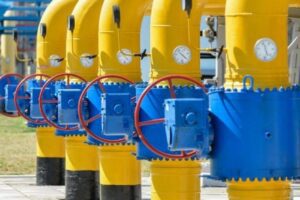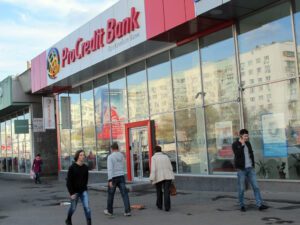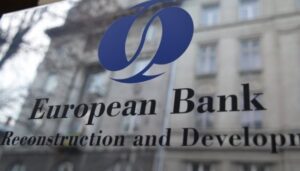
New funds follow steps by Ukravtodor towards strengthening governance
-€190 million loan tranche to upgrade sections of M-05 Kyiv-Odesa road
-Funds extended as road agency takes steps towards strengthening governance
-Reform at Ukravtodor a litmus test for broader anti-corruption programme
Encouraged by steps taken by Ukraine’s state road agency Ukravtodor, the Board of Directors of the European Bank for Reconstruction and Development (EBRD) has approved a new €190 million loan tranche for further improvements to the country’s road infrastructure.
Part of a €450 million package, the tranche will finance the upgrade of sections of the M-05 Kyiv-Odesa road in the Kirovohrad, Mykolaiv and Odesa regions.
The provision of the new tranche follows efforts by Ukravtodor to review its governance systems, with a view to advancing reforms. These include a comprehensive anti-corruption action plan developed by independent experts, which was approved by a high-level steering group comprising representatives of the government, the president’s office, the EBRD and Ukravtodor itself.
The plan, which is already being implemented, envisages a robust approach to integrity compliance, improved corporate governance and internal anti-corruption controls, policies and procedures. It also aims to pave the way for a culture of integrity throughout the organisation.
Ukravtodor’s effort to fight corruption in road building is the pilot programme under the memorandum of understanding signed in October 2020 between the government of Ukraine and the EBRD to strengthen corporate governance in the state sector. It is seen as a litmus test for a broader anti-corruption and good governance programme backed by the EBRD and targeting Ukrainian state-owned enterprises and public-sector entities.
In addition, Ukravtodor has prepared an e-mobility action plan to support electric-vehicle deployment in the country and is establishing a Road Safety Department.
The EBRD is a leading institutional investor in Ukraine. To date, the Bank has invested almost €16 billion in 506 projects across the country, with a focus on assisting economic stabilisation, anchoring reforms, strengthening energy efficiency and energy security, and supporting agricultural and industrial projects as well as smaller businesses.

Ukroliya LLC (Chernechy Yar, Poltava region) on August 10 agreed with the European Bank for Reconstruction and Development (EBRD) that the company will raise a loan of EUR 16 million to finance its capital expenditures, working capital requirements, as well as to restructure existing debt, according to a press release from the EBRD.
“The main objective of the project is to support the company’s growth plans and its strategy to expand further in more profitable, premium (organic and high-oleic) and value-added (bottled and refined) sunflower oil sub-segments,” the bank said in the press release.
In addition, as part of the project, Ukroliya, will set up an accredited in-house training centre, in collaboration with local education partners, which will support the company in meeting its skills needs and provide training opportunities for people in Poltava region.
According to the EBRD, the project will support modernisation of the company’s production facilities, including the installation of a biomass boiler and processes to reduce oil content in wastes and reprocess materials for filtering, as well as the increase in production of organic vegetable oil and purchases of organic oilseeds.
The EBRD said that the total cost of this project is EUR 16 million, of which Ukroliya will receive the total required amount.
The press release does not contain other details of the transaction.
Ukroliya LLC was founded in 2001. It is engaged in the production and sale of packaged and bulk sunflower oil, sunflower cake, and husk. Its production facilities are located in the townships of Dykanka and Zinkiv (both in Poltava region).

The European Bank for Reconstruction and Development (EBRD) and the Gas Transmission System Operator of Ukraine (GTSOU) have signed an agreement to formalise their cooperation on low-carbon hydrogen and to develop hydrogen supply chains.
“I am very pleased that the EBRD and GTSOU are cooperating to support each other’s activities regarding hydrogen. Ukraine relies heavily on fossil fuels across all sectors of its economy and hydrogen can represent a good alternative for decarbonisation, and reduce reliance on fossil fuels. Supporting the green transition of our economies is a key priority for the EBRD,” EBRD Managing Director for Green Economy and Climate Action Harry Boyd-Carpenter said.
CEO of GTSOU Sergiy Makogon said that the challenge of hydrogen therefore is to develop technology to scale up hydrogen use, to create the necessary conditions and infrastructure for its production, transportation and consumption.
“All this requires time, effort and cooperation by all stakeholders. We recognise the role of natural gas as one of the key energy sources and transition fuel on the path to carbon-free economy, which will remain significant for this transition period. As the operator of the gas transmission system, our task is now to prepare our infrastructure for the decarbonised energy markets of the future,” he said.
According to the report, the EBRD recently launched a study on the potential for developing different segments of the hydrogen supply chain across many of the economies where it invests, including Ukraine.

The European Bank for Reconstruction and Development (EBRD) has provide ProCredit Bank (Kyiv) with a four-year amortising senior unsecured loan of up to EUR 25 million equivalent for on-lending to eligible micro, small and medium-sized enterprises (MSMEs).
According to the EBRD’s report to the Interfax-Ukraine agency on Friday, the agreement was signed by EBRD Managing Director for Financial Institutions Francis Malige and Board Chairman of ProCredit Bank Viktor Ponomarenko.
In addition to long-term financing, eligible sub-borrowers will receive technical assistance funded by the EU and grant support in the form of investment incentives upon the completion of their investment projects.
At least 70% of all financed sub-loans are expected to be compliant with EBRD Green Economy Transition (GET) approach.
ProCredit Bank was founded in 2001. Its only shareholder at the beginning of 2021 was ProCredit Holding (100% of shares).
According to the National Bank of Ukraine, as of March 1, 2021, ProCredit Bank ranked 16th in terms of total assets (UAH 27.413 billion) among 73 banks operating in the country.

The European Bank for Reconstruction and Development (EBRD) has improved its forecast for the economic growth in Ukraine in 2021 from 3% to 3.5%, according to its June forecast.
GDP is expected to grow by 3.5% in both 2021 and 2022, the EBRD said in its June regional economic prospects.
According to the report, the main risks are associated with the slow progress of reforms in the country and the relatively slow pace of vaccination, the bank’s analysts say.
Although the economy contracted 2% year-on-year in the first quarter of 2021 due to prolonged quarantine restrictions, there are indications that it is gradually returning to growth in the second quarter thanks to higher commodity prices, the EBRD said.

The European Bank for Reconstruction and Development (EBRD) will provide a EUR 10 million two-year committed local currency-denominated working capital loan to the Ukrainian electricity and gas supplier ERU Trading LLC.
As stated in a report of the bank, the decision was made by the board of directors on June 9.
“EBRD funds will be used to support growing gas trading operations of ERU Trading in order to secure low cost gas from EU during summer season and store it in Ukrainian gas storages with further sale in Ukraine,” the EBRD said.
According to EBRD, the proposed project supports a private, independent trader in competing with the dominant player, Naftogaz, in an increasingly liberalised market, and facilitates increased liquidity and competition on the private energy exchange UEEX following the MoU signed by the EBRD in July 2020.
The EBRD will become the first international financial institution in the existing loan portfolio of ERU Trading.
ERU Trading LLC, established in 2016, belongs to Yaroslav Mudry and Dale Perry. According to the information on the company’s website, gas supplies to the population are an important part of its strategy. In February of this year, the company received the license from the energy regulator.
EBRD, ELECTRICITY, GAS, LOAN